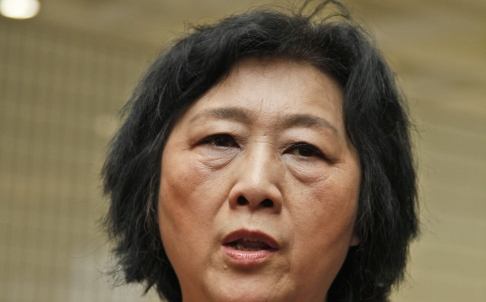Veteran journalist Gao Yu, who was sentenced to seven years in prison in April for allegedly leaking an internal Party document, was granted a sentence reduction and medical release on Thursday, The Wall Street Journal’s Te-Ping Chen reports:
On Thursday morning, the Beijing high court took two years off the seven-year sentence that Gao Yu, 71, was originally issued by a trial court earlier this year. That court convicted her on charges of leaking state secrets for providing an internal party memo to an overseas Chinese news site. The memo, known as Document No. 9, described ideological threats to the party, including an independent judiciary and freedom of the press.
A lawyer for Ms. Gao, Shang Baojun, said the high court upheld the original conviction and didn’t provide a reason for reducing her sentence. The court didn’t immediately respond to a request for comment on the sentencing.
However, according to Mr. Shang and an evening report published by the official Xinhua News Agency, Ms. Gao was also separately granted medical release, permitting the septuagenarian to serve the duration of her sentence outside of prison, including in a hospital or while receiving care at home, her lawyer said.
[…] The court’s Thursday affirmation of the original conviction sparked condemnation. It might be encouraging for Ms. Gao, the diplomat said, “but in terms of the principle of people being able to freely express themselves and exchange information, the fact that the sentence was confirmed in the appeal is very discouraging.” [Source]
Similarly, from Human Rights in China:
“Allowing Gao to serve a reduced sentence outside prison, though a relief for her, does not take away the glaring fact that her prosecution was a politicized use of the law to punish speech,” said Sharon Hom, Executive Director of Human Rights in China. “Gao Yu’s case also highlights serious systemic concerns raised, such as independence of the judiciary and access to justice, during the rigorous scrutiny of China by the UN Committee Against Torture earlier this month.”
“It is a crime even to sentence Gao Yu to one day of imprisonment,” said rights defense lawyer Tang Jitian (唐吉田) in a comment he released. “I urge the international community to not let up its appeal for Gao and other prisoners of conscience.” [Source]
Gao’s release came as an apparent reward for reaffirming her guilt, after withdrawing a confession televised before the trial claiming that investigators had coerced her using threats against her son. Such a deal was reportedly offered months ago, but Gao initially refused.
A confession obtained under duress would be inadmissible under Chinese law. Gao’s lawyer Shang said after the trial that prosecutors had presented no physical evidence or witnesses. The recipient of the leaked document has stated that his source was actually a senior Party official, and that his written testimony defending Gao was refused by the court. Even the document’s designation as a state secret has been questioned. As Amnesty’s Nicholas Bequelin commented after the original verdict, the label is often applied as “the weapon of choice to silence critics, dissenters, journalists and party foe[s].”
Deutsche Presse-Agentur has published a brief profile of Gao:
She was locked up for 15 months on the eve of the Tiananmen crackdown in 1989.
Labelled a public enemy by the Beijing mayor, she was accused of authoring a “political programme” for “turmoil and rebellion,” according to the International Federation of Journalists. She was released on medical parole.
She was jailed again in 1993 for six years for leaking state secrets, according to Hong Kong daily the South China Morning Post.
During that time she was awarded the Guillermo Cano World Press Freedom Prize by UNESCO, who said she had been “fighting for years for press freedom in her country.” [Source]
Read more about Gao and conditions for journalists in China via CDT.







